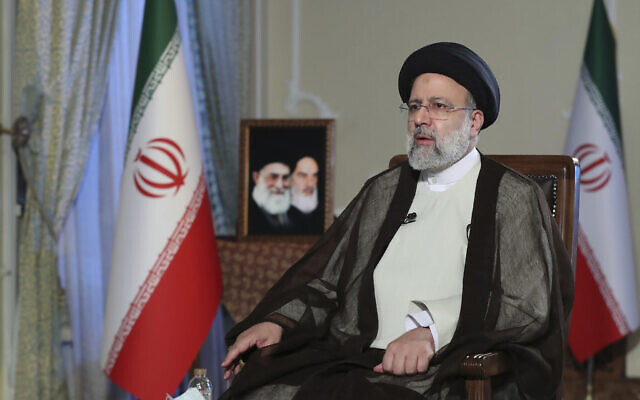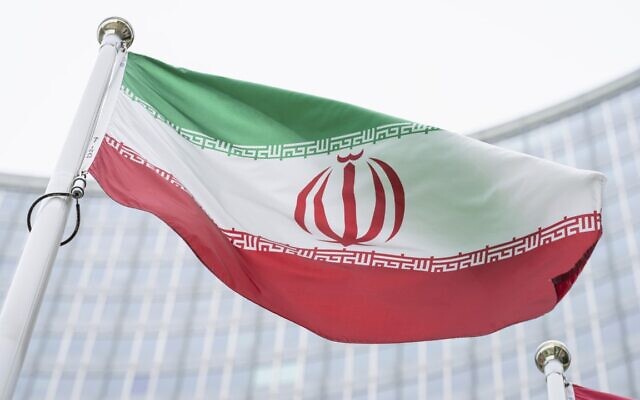The United States warned Saturday that it would not allow Iran to “slow walk” international negotiations over its nuclear program while at the same time ramping up its atomic activities.
The warning came a day after Washington hit out at Iran, saying talks with world powers on a return to the 2015 nuclear accord had stalled because Tehran “does not seem to be serious.”
“We can’t accept a situation in which Iran accelerates its nuclear program and slow walks its nuclear diplomacy,” said a senior US administration official — echoing a recent warning by US Secretary of State Antony Blinken.
Speaking to reporters after returning from the Austrian capital, the official said Washington was not yet planning to walk away from the indirect talks that it resumed with Tehran last week in Vienna, but hoped Iran would return “with a serious attitude.”
Still, he said, Washington was “preparing for a world in which there is no return to the JCPOA,” a reference to the deal’s official name, the Joint Comprehensive Plan of Action.
He said more sanctions would likely come if Washington concludes that Iran had killed the negotiations.
In Vienna “Iran did not show the posture of a country that is seriously thinking of a rapid return” to the accord aimed at putting curbs on its nuclear program, said the official.
The Coburg Palais, the venue of the Joint Comprehensive Plan of Action (JCPOA) revival talks, in Vienna on November 29, 2021. (VLADIMIR SIMICEK / AFP)
He spoke as the head of Israel’s Mossad spy agency prepared to head to Washington in the coming days for talks with top administration officials.
The Haaretz newspaper reported that David Barnea will seek to convince US leadership not to seek an interim deal with Iran that would not see Tehran return to full compliance with the deal.
According to Channel 12, Barnea plans to present the Americans with new information on Iran’s program.
The seventh round of nuclear talks ended Friday after five days in Vienna, with delegations returning to their national capitals and expected to go back to Austria next week.
Iran had paused the talks in June following the election of ultraconservative President Ebrahim Raisi.

In this photo released by the office of the Iranian Presidency, Iranian President Ebrahim Raisi speaks during a live interview in Tehran, Iran, broadcast on state-run TV, on Monday, October 18, 2021. (Iranian Presidency Office via AP)
The official argued that the US had shown patience in allowing a five-month break in the process, but that during that time the Iranians were “continuing to accelerate their nuclear program in particularly provocative ways.”
When Tehran finally returned to the table on Monday, he said, it was “with proposals that walked back any of the compromises that Iran had floated during the six rounds of talks.”
He accused Iran of seeking to “pocket all of the compromises that others — the US in particular — had made and then ask for more.”
The official said he believed countries that are close to Iran were also vexed by Tehran’s positions at the recent talks.
“I think we’re seeing very clearly that countries around the world are now more and more aware of the fact that Iran is taking a position which is inconsistent with their stated goals of a return to the JCPOA and their accelerated nuclear program is Exhibit A in that,” he said.

The flag of Iran waves in front of the the International Center building with the headquarters of the International Atomic Energy Agency, IAEA, in Vienna, AustriaI, on May 24, 2021 (AP Photo/Florian Schroetter, File)
The official said it was not yet known when the European Union coordinator would reconvene the parties, but that the date “matters far less to us than whether Iran will come back with a serious attitude, prepared to negotiate seriously. ”
At this stage, he said the US will pursue its efforts at diplomacy — but reasserted it has “other tools” at its disposal should negotiations fail.
He added: “The time that the JCPOA has for still remaining a viable deal is inversely proportional to the speed with which Iran advances its nuclear program. If they choose to accelerate the nuclear program as they seem to have done of late, then there’d be less time left for the JCPOA to be resurrected.”
The landmark 2015 nuclear accord — initially agreed between Britain, China, France, Germany Iran, Russia and the US — began unraveling in 2018 when then-US president Donald Trump pulled out and reimposed sanctions, prompting Iran to start exceeding limits on its nuclear program the following year.
US President Joe Biden has said he wants to re-enter the deal, and the US has been participating in this week’s talks indirectly.
Iran insists that its nuclear program is peaceful.